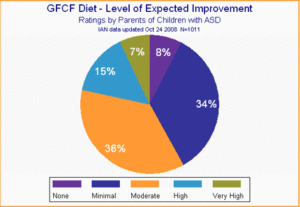It is a universal truth that the food we eat has a direct effect on our bodies and, by extension, our behaviors.  Everyone has a slightly different diet, which impacts the way they feel and behave. This leads to the idea that food and diet could also be used to help refine or improve our health, mood and behaviors. For autistic people, many experts recommend special diets in order to help relieve some of the symptoms of autism and improve overall functioning. One of the most commonly recommended diets is one that eliminates gluten and casein. Gluten and casein are proteins that are found in grains and milk, respectively. The diet that is recommended would therefore prevent the consumption of all milk products and most grains.
Everyone has a slightly different diet, which impacts the way they feel and behave. This leads to the idea that food and diet could also be used to help refine or improve our health, mood and behaviors. For autistic people, many experts recommend special diets in order to help relieve some of the symptoms of autism and improve overall functioning. One of the most commonly recommended diets is one that eliminates gluten and casein. Gluten and casein are proteins that are found in grains and milk, respectively. The diet that is recommended would therefore prevent the consumption of all milk products and most grains.
When the diet is effective, it theoretically helps alleviate some of the symptoms of autism and makes it easier for autistic people to function in everyday life.While this diet is not guaranteed to have a significant effect on autism symptoms, there have been studies where it has been shown to be beneficial for some people on the autism spectrum. Gluten and casein are both peptides and, in theory, when they are broken down in the body, they interact with certain opioid receptors in the brain and increase autistic behaviors. The idea is that if these peptides are removed from the body, these interactions would be prevented and autistic behaviors would decrease or disappear altogether. However, there is not much empirical evidence that the interaction of peptides with opioid receptors is actually what causes autistic behaviors.
Despite the lack of evidence, many people turn to this diet with the hope that it will at least help a little to relieve some  autism symptoms. Like many other therapies, it can be effective for some people but no one should assume that it will definitely help. One autism research center recommends using the diet only if the autistic person has a history of gastrointestinal problems, which can be fairly common amongst autistic people.
autism symptoms. Like many other therapies, it can be effective for some people but no one should assume that it will definitely help. One autism research center recommends using the diet only if the autistic person has a history of gastrointestinal problems, which can be fairly common amongst autistic people.
Overall, if you follow this diet yourself or recommend it to someone, the most important thing is that people on this diet make sure to maintain proper nutrition and if you do not see a result after several months of following the gluten-free and casein-free diet, it  might be beneficial to stop and try an alternative therapy. It will definitely not work for everyone but some people may find it extremely helpful.
might be beneficial to stop and try an alternative therapy. It will definitely not work for everyone but some people may find it extremely helpful.
Additional Sources:
https://iancommunity.org/cs/what_do_we_know/special_diets
https://www.autism.com/gfcf
http://journals.sagepub.com/doi/pdf/10.1177/0883073814531330
Pictures:
glutenfreeherald.com/can-a-gluten-free-diet-help-children-with-autism
homecuresthatwork.com/6106/fighting-back-autism-with-gfcf-diet
mommylevy.com/2012/11/gfcf-diet-for-kids-with-autismaspergersadhd.html
autismspeaks.org/news/news-item/ian-research-report-special-diets
I appreciate how you addressed the topic of alternative medicines to relieve symptoms of autism. This topic is interesting especially because I feel that many people believe that behavioral interventions and therapies are the only ways to go about reliving symptoms of autism. Also, I like how you pointed out that this diet does not work for everyone. I feel that it is important for families to know the risks before undergoing this diet, and I would enjoy learning more about the side effects of the gluten-free and casein-free diet.
I feel that it is also important to note that these diets should not be used as an attempt to cure autism. Instead of trying to find a cure for autism, we should relieve the harsh symptoms as best as we can while still celebrating the uniqueness these individuals offer society.
This is a well-written post and has prompted me to look more into the use of gluten-free and casein-free diets to relieve symptoms of autism.